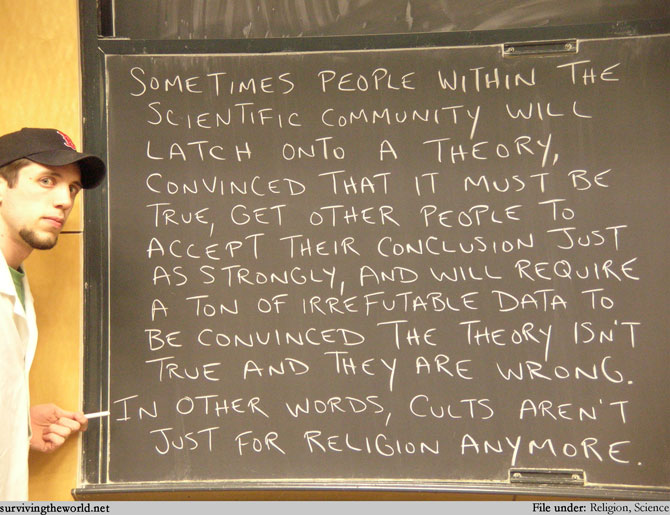I’m writing an essay on violence in the Old Testament tonight. I’m interacting a little with the way violence has been interpreted by the “new atheists” – this review of Hitchen’s God is Not Great is fantastic fodder for anybody confronted with one of his raving disciples… it addresses his erroneous treatment of the Bible from Genesis to Jesus – and I reckon it’s just as good as Eagleton’s famous review of Dawkins.
Eagleton is famously a Marxist Catholic (and possibly agnostic), while William Hamblin, who wrote this review, is a Mormon professor of Ancient History. But you know, the enemy of me enemy and all that…
Here are some good bits… it’s quite a long article.
On the Bible
Remarkably, Hitchens is overtly disdainful of the careful reading of ancient texts in their original languages. He bemoans the supposed fact that “all religions have staunchly resisted any attempt to translate their sacred texts into languages ‘understood of the people’ ” (p. 125, emphasis added). This is a stunningly erroneous claim, betraying almost no understanding of the history of religion. In reality, the translation of religious texts has been a major cultural phenomenon in ancient and medieval times and has steadily increased through the present. The Bible, of course, is the most translated book in the history of the world. According to the United Bible Societies, it has been translated into 2,167 languages, with another 320 in process. And this is by no means merely a modern phenomenon. The Bible was also the most widely translated book in the ancient world. It was translated into Greek (the Septuagint, second century BC), Aramaic (Targum, by the first century BC), Old Latin (second century AD), Syriac (Peshitta, third century AD), Coptic (Egyptian, fourth century AD), Gothic (Old German, fourth century AD), Latin (Jerome’s Latin Vulgate, late fourth century AD), Armenian (early fifth century AD), Ethiopic (fifth century AD), Georgian (fifth century AD), Old Nubian (by the eighth century AD), Old Slavonic (ninth century AD), and Arabic (Saadia Gaon’s version, early tenth century AD). Thus, far from “staunchly resist[ing] any attempt to translate their sacred texts” (p. 125), Christians have consistently made tremendous efforts to translate their sacred books.
On the law
It is not just the early Iron Age science of the Bible that Hitchens finds offensive. The morality of the Bible, which many feel is foundational to Western civilization, is to Hitchens pure barbarism. But when we read Hitchens’s claim concerning “the pitiless teachings of the god of Moses, who never mentions human solidarity and compassion at all” (p. 100), we are left to wonder if Hitchens has read the Bible he despises with any degree of earnestness whatsoever. The Hebrew Bible speaks frequently of God’s compassion and his enduring “loving-kindness” or “steadfast love.” When Christ taught, “Love your neighbor as yourself” (Matthew 22:39), he was, in fact, quoting the Hebrew Bible (Leviticus 19:18; see Zechariah 7:8). Furthermore, the law insists that Israelites must have compassion for foreigners as well for their own kinsmen (Exodus 22:21; Leviticus 19:34; Deuteronomy 10:19). The prophet Hosea likewise taught that God preferred “steadfast love” over “sacrifice” (Hosea 6:6). The teaching of Hosea 6:6 is commonplace throughout the Hebrew Bible, representing a standard component of Jewish temple theology.
On oxen
For Hitchens the principles found in the law of Moses tend to be either transparently obvious (pp. 99–100) or barbarically “demented pronouncements” (p. 106). He objects to all sorts of things in the law, such as the “insanely detailed regulations governing oxes [sic]” (p. 100), which go on for an astonishing five verses (Exodus 21:28–32)! Actually, by ancient standards—for instance, when compared to the fourteen oxen regulations in Hammurabi’s Code—this is notably succinct. Considering that oxen were a major form of transportation in early agrarian Near Eastern societies, it is reasonable to expect some regulations about them; but, even if superfluous, there is nothing “insanely detailed” about it, especially when compared to our modern laws concerning vehicular manslaughter—probably the closest modern analogy. Hitchens really has no substantive point here beyond mere rhetorical bombast.
On weekends
Hitchens’s view of the Sabbath commandment as “a sharp reminder to keep working and only to relax when the absolutist says so” (p. 99) again fails to contextualize the text. In its ancient setting it should be seen as a progressive and humanitarian regulation ensuring that rulers and masters gave their slaves and laborers a day of rest (Exodus 20:10)—a practice that is apparently original to the Israelites—rather than forcing them to work unremittingly. Though it goes unacknowledged, Hitchens owes his weekends and also the concept of a “right” to leisure to the God of Israel—no thanks required. Only by rhetorical sleight of hand can Hitchens try to turn this blessing into an act of supposed tyranny.
On Jesus
Hitchens’s overall disdain for the life of Jesus is reflected in the fact that he can’t be bothered to even get basic biblical chronology straight. “Even the stoutest defenders of the Bible story,” he assures us, “now admit that if Jesus was ever born it wasn’t until at least AD 4” (pp. 59–60). They do? He has obviously been reading different “stout defenders” of the Bible story than I have. The Gospel narratives agree that Jesus was born during the lifetime of Herod the Great (Matthew 2:1; Luke 1:5), who died in 4 BC.
Here’s the conclusion:
He consistently misrepresents what the Bible has to say, fails to contextualize biblical narratives in their original historical settings, implies unanimity among biblical scholars on quite controversial positions, and fails to provide any evidence for alternative scholarly positions, or even to acknowledge that such positions exist at all. In reality, biblical studies is a complicated field, with a wide range of subtle nuances and different interpretations; for Hitchens, it is sufficient to dismiss the most extreme, literalistic, and inerrantist interpretations of the Bible to demonstrate not only that the Bible itself is thoroughly flawed, false, and poisonous but that God does not exist.

